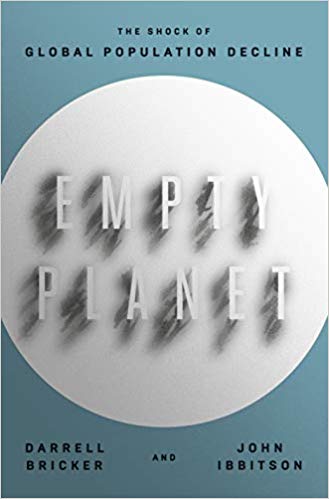You have /5 articles left.
Sign up for a free account or log in.
Empty Planet: The Shock of Global Population Decline by Darrell Bricker and John Ibbitson
Published in February of 2019.
What do you worry about?
Climate change? The concentration of wealth and growing inequality? Robots taking all the jobs? Our crumbling infrastructure? Public disinvestment from higher education?
I worry about babies. A lack of babies. Too few babies.
A few years ago my family visited South Korea. The total fertility rate (TFR) in South Korea is 1.3. That means that, on average, a South Korean woman will give birth to 1.3 babies in her lifetime.
As replacement fertility requires a TFR of 2.1 - as both mom and dad need to be replaced - South Korea’s population (absent immigration or reunification) will eventually decline.
By 2050 the South Korean population will have declined 51. 5 million today to under 40 million. Four-in-ten of the remaining South Koreans will be 65 and older.
When you visit South Korea what is striking is all the missing children. Public places such as airports and shopping centers are bustling, but you hardly ever see any kids. Catching a glimpse of a stroller is rare.
As I walked around Seoul with my kids (then in their mid-teens), I kept wondering about what was going to happen to South Korean universities? Who did they expect would attend?
If you also worry about too few babies, then reading Empty Planet will do nothing to assuage your fears. Our future world, argue the Canadian authors Bricker and Ibbitson, is likely to look like today’s South Korea.
A world without babies has already become the reality in many wealthy countries. The TFR in Taiwan and Singapore is 1.2. Hong Kong is 1.3. Japan’s TFR is under 1.5. European countries also boast astoundingly low fertility rates. Italian women produce on average less than 1.5 babies. In Portugal, the TFR is closer to 1.2. Spanish women have on average 1.4 babies. Same with the Germans.
What is perhaps surprising is that now the world’s middle and low-income countries are following the fertility patterns of the wealthy. The TFR in Thailand is less than 1.5. In Hungary, the total fertility rate has dipped below 1.4. Brazilian women now have an average of 1.7 babies. And the country with, for now, the largest population - China - has a TFR 1.6.
The authors Empty Planet are convinced that these countries, and many others, are likely to follow South Korea’s fertility path to even few babies. Even India, with a TFR just above replacement, is expected to experience rapid fertility declines as the country develops and urbanizes.
Far from worrying about energy and food shortages brought on by a growing population, the authors of Empty Planet believe that we are in for a future of population-decline based slow growth. Fewer babies will eventually mean not only fewer college students, but fewer consumers and fewer inventors.
Countries with few children will have a proportionately large share of elderly. Countries with public pension systems and medical insurance for the elderly pay for these entitlements through taxes on workers. These are pay as you go systems, with current workers supporting current retirees.
The authors of Empty Planet seem to think that the US will do pretty well in a world of eventual declining population.
I’m not so sure.
Bricker and Ibbitson point out that many people still want to move to the United States. U.S. colleges and universities welcomed over 1 million international students last year. If we are lucky, at least some of these students will want to stay once they graduate.
I wonder what will stop the U.S. from moving to a fertility profile that looks like South Korea, Japan, Italy, or almost every other wealthy country? I worry that our TFR could fall off a cliff. That we could go from a TFR of 1.9 to something closer to 1.5 in a few years.
Yes, we are lucky that so many people want to move to the U.S. But in a world where fertility is rapidly declining in emerging economies, the push to move to the U.S. for economic reasons may not be so forceful in the future. Fewer babies will eventually mean lower overall growth (fewer workers, less demand), and an aging population - but it also means less competition for jobs.
How many people do you know who have decided not to have kids, or have only one kid, because raising children is so expensive? That higher education and housing costs have risen much faster than wages will surely dissuade many couples from having children.
If you have kids, do you think that they will eventually have two or more kids of their own? I sort of doubt that my kids will be off our family cell plan until they are 30. I have trouble imagining them not only being economically independent but making enough money to rent or buy a house in a decent school district - much less save for their kids' college.
So I’m not so sure that the authors of Empty Planet get the U.S. right. I think they should be more worried than they are.
If you are worried about overpopulation, then please read Empty Planet, and get back to us if your thinking has moved any after finishing the book.
If you, like me, are worried about not enough babies - reading Empty Planet will only serve to have you conclude that perhaps you haven’t been worrying enough.
What are you reading?





